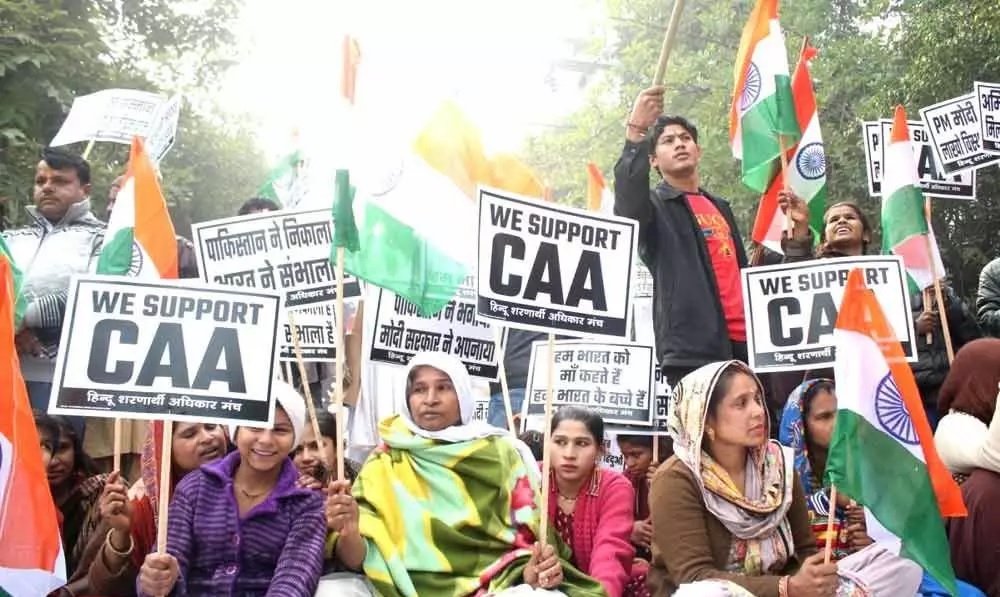
- The US and other countries in the West should look into their history before commenting on the internal affairs of other countries through their various channels, including the media and think tanks.
- The United States not only implemented similar laws to those present in the Indian Citizenship Amendment Act (CAA), but it also tailored them to its advantage.
- It would be prudent for the US, taken aback by the stern message from the MEA regarding the CAA, to reflect on its history before hastily assessing a sovereign and democratic nation like India.
- India’s proactive response should continue, ensuring its progress is not impeded by external pressures driven more by political optics than reasoned debate.
The US State Department spokesperson has repeatedly stated his nation’s so-called concern over the CAA and other internal matters of India, including commenting on the investigations involving certain political leaders. This isn’t the first instance of the US or the West’s interference in India’s internal affairs. Last year, during the Manipur imbroglio, both the United States and the United Kingdom felt compelled to justify themselves globally to comment on the local strife between the Meitei and Kuki communities. It begs the question of why these nations feel the need to assert their moral superiority on such sensitive matters that are India’s internal matters and exacerbate tensions.
In today’s article, I aim to draw the reader’s attention to several pressing issues in nations that have raised questions about India, its policies, and its affairs. This article will address concerns regarding legislation and bias, striving to be straightforward and concise. It’s imperative at times to underscore why the US and other countries in the West should look into their backyards and history before commenting on the internal affairs of other countries through their various channels, including the media and think tanks.
When the US Ambassador, Eric Garcetti, expressed concerns about the Citizenship Amendment Act, it wasn’t a surprising move but rather a recurrent tactic of the US, which often seeks to exert influence. Facing challenges both domestically and internationally, the US often tries to redirect focus and adopt an overbearing stance toward other nations. Many tend to regard the US attitude as a benchmark of validation, using it to criticize any legislation India introduces to rectify political and historical errors, as seen with the CAA.
Legislations Similar to the CAA in the US
The CAA addresses many faults that occurred during partition, as highlighted by our Foreign Minister at a recent summit. During the same interaction, Dr S Jaishankar raised pertinent questions about specific US legislations that grant citizenship to groups facing persecution worldwide. Below I shed light on a few such legislations in the USA.
1. The Cuban Adjustment Act, also known as the “Ley de Ajuste Cubano” Public Law 89-732, is a United States federal law enacted on November 2, 1966. Considered US’s own CAA, it was passed by the 89th United States Congress and signed into law by President Lyndon Johnson. The law applies to any native or citizen of Cuba who has been inspected and admitted or paroled into the United States after January 1, 1959 and has been physically present for at least one year and is admissible to the United States as a permanent resident. This law came right after the Cuban revolution and the dreadful actions on the citizens by the Communist regime of Fidel Castro. The US brought an act and even made some adjustments to it later but it is still in effect to this day.
2. The Jackson–Vanik amendment to the Trade Act of 1974 is a provision in US federal law that affected trade relations with countries possessing non-market economies, primarily those within the Soviet Bloc that imposed restrictions on Jewish emigration and other human rights. It passed unanimously in both houses of the US Congress and was signed into law by President Gerald Ford. Over time, certain countries were granted conditional normal trade relations, contingent upon annual reviews to assess their compliance with the amendment’s criteria, while others were liberated from its constraints. The amendment revoked the most favoured nation status for countries that curtailed emigration, deemed a fundamental human right. Nations subject to the amendment included the Soviet Union (and later its successor states), the People’s Republic of China, Romania, Hungary, Czechoslovakia, East Germany, Bulgaria, Mongolia, Albania, Cambodia, Laos, and Vietnam. Initially, Poland was exempt, but its most favoured nation status was suspended from 1982 to 1987 due to actions against Solidarność. Yugoslavia was also initially exempt, but in 1991–1992, the most favoured nation status of Serbia and Montenegro was suspended due to violent events in the former Yugoslavia. This legislation not only aimed to assist persecuted groups seeking to leave their host nations for the US but also targeted the economic standing of the concerned countries, operating under the belief that a specific economic system could exacerbate persecution within their societies. Consequently, the US utilized this amendment as a potent tool against Russia and other targeted nations.
Since 1975 more than 500,000 refugees, mostly who were Jews, evangelical Christians, and Catholics from the former Soviet Union, have been resettled in the United States. An estimated one million Soviet Jews immigrated to Israel during that time. This resulted in a substantial increase in the population of these communities isn’t the US.
3. The Lautenberg Amendment, Public Law 101–167, was enacted on November 21, 1989, and became effective in 1990. This amendment granted refugee status in the United States to nationals from the USSR, later including Russia, Ukraine, Estonia, Latvia, or Lithuania who were Jews, Evangelical Christians, Ukrainian Catholics, or Ukrainian Orthodox, as well as nationals of Vietnam, Laos, or Cambodia, and Jews, Christians, Baha’is, and other religious minorities from Iran. It allowed refugee status to individuals from historically persecuted groups without requiring them to demonstrate individual instances of persecution. Under the Lautenberg Amendment, between 350,000 to 400,000 Jews from the former Soviet Union, who had not provided evidence of persecution, gained entry to the United States by October 2002, as reported by the Jewish Telegraphic Agency. Some Hindu-American experts argue that the Citizenship Amendment Act (CAA) of India is almost analogous to the Lautenberg Amendment, albeit with some variations in effect in the United States today.
4. Short-term program for Hungarians: According to an archived link from the US State Government, a short-term program was established for Hungarians fleeing Soviet persecution following the forceful Soviet suppression of the Hungarian rebellion in Budapest. In the aftermath, thousands of Hungarians were killed by Red Army troops, and hundreds of thousands sought asylum in the West. Upon learning of the crackdown, the United States swiftly condemned it and took action by introducing United Nations resolutions and providing aid. In addition to leading UN efforts to denounce Soviet actions in Hungary and Poland, the United States implemented a special immigration quota in 1956 for refugees fleeing the communist crackdown. By May 1957, over 30,000 Hungarians had resettled in the United States through this program.
A Mirror to US Hypocrisy
The United States not only implemented similar laws to those present in the Indian Citizenship Amendment Act (CAA), but it also tailored them to its advantage, while it has also ensured that any criticisms of these legislations are brushed off in a hegemonic manner. Unlike the CAA brought by the Indian government under Prime Minister Narendra Modi, which does not target the economic ability of the host nations of the persecuted communities, the US legislation does exactly that. It’s concerning that some experts choose to overlook this aspect due to the US’s dominant position, either seeking validation for their agendas or sowing discord within Indian society.
Therefore, it would be prudent for the US, taken aback by the stern message from the Ministry of External Affairs regarding the CAA, to reflect on its history before hastily assessing a sovereign nation like India. For India, this serves as an important lesson as it navigates internal affairs under external scrutiny. India’s proactive response should continue, ensuring its progress is not impeded by external pressures driven more by political optics than reasoned debate.
Recent comments from the US and Germany regarding the arrest of Arvind Kejriwal have drawn attention, but the Indian Foreign Ministry has responded effectively. My aim for readers, whether residing outside India or within the country, is to encourage open-mindedness in assessing events and react without bias or judgment. While flaws can be forgiven, ignorance cannot, more so when clarity is evident.
(Anhad Jakhmola is a postgraduate scholar in international relations. He has his undergraduate degree in history and is pursuing his Ph.D. in Defence and Strategic Studies. He is a columnist for many portals and is a keen public speaker in debates and discussions. Views expressed are author’s own)

